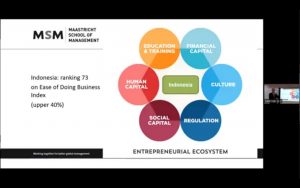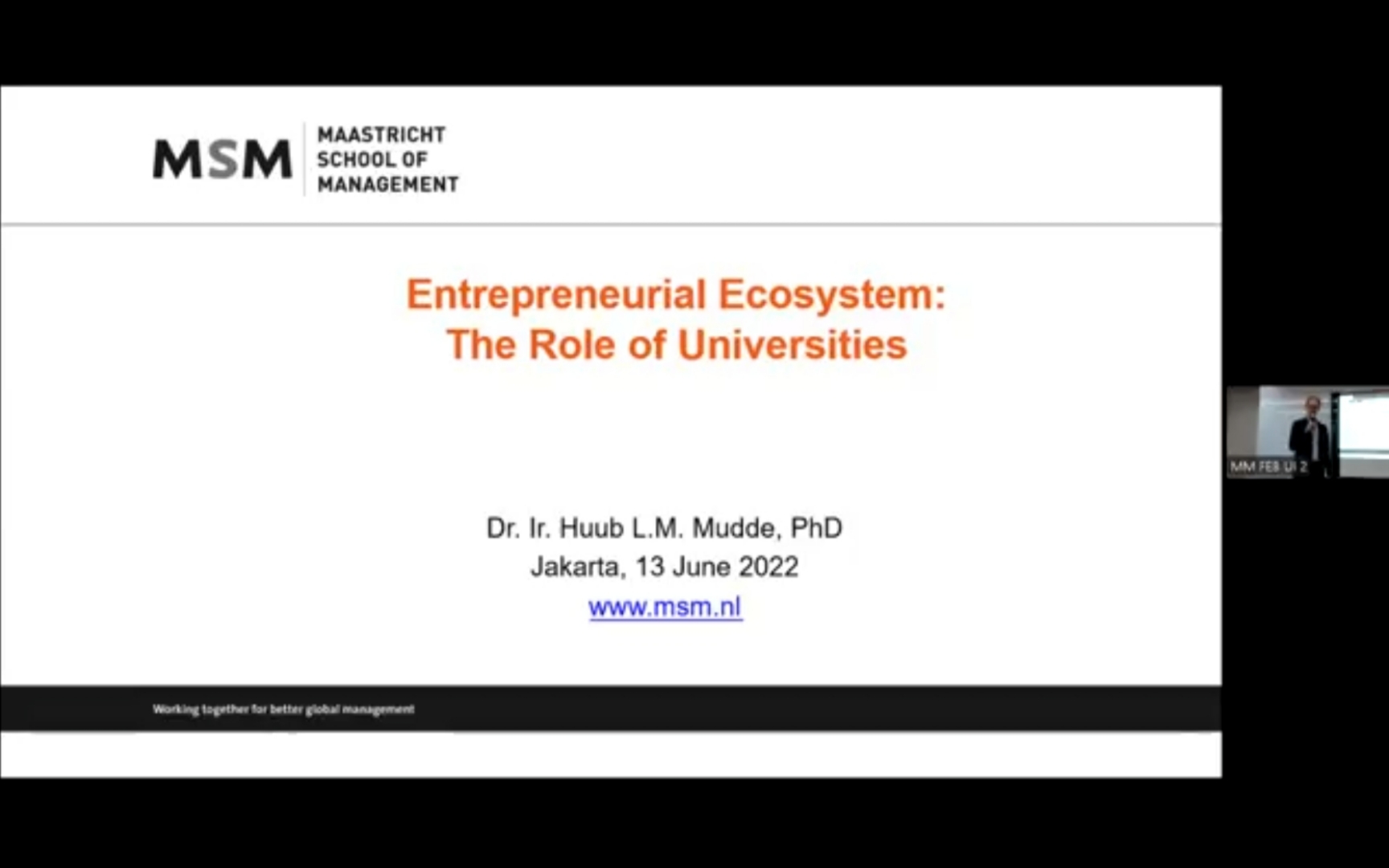Public Lecture of Master of Management FEB UI, Entrepreneurial Ecosystem: The Role of Universities
Rifdah Khalisha – Public Relations FEB UI
DEPOK – (13/6/2022) Master of Management (MM) FEB UI, together with Maastricht School of Management (MSM), held a public lecture entitled “Entrepreneurial Ecosystem: The Role of Universities” on Monday (13/6). The speakers were Dr. Ir. Huub L. M. Mudde, Ph.D. (Senior Project Consultant and Assistant Professor at MSM) and Arief Wibisono Lubis, Ph.D. (Vice Dean for Education, Research, and Student Affairs). The event occurred in a hybrid setting, in the Pegadaian Room, FEB UI Salemba Campus.
Dr. Arief revealed, “According to the Global Entrepreneurship Index (GEI), Indonesia is currently in 75th position out of 137 countries. Entrepreneurship is the key for Indonesia to grow into a developed country. President Jokowi stated that one of the requirements for a developed country is that the number of entrepreneurs must reach at least 14% of the population.”
“In Indonesia, it is still relatively low, only 3.47%. Therefore, we need acceleration. Indonesia has not been able to compete on an international scale due to the low interest of the population in entrepreneurship. Malaysia, Singapore, and Thailand have reached an average value of 4%,” he added.
Moving on from that problem, Mudde, through this public lecture, tried to elaborate that the entrepreneurial ecosystem shows an interconnected community between various components to support new entrepreneurs.

Mudde said, “In principle, there are already many entrepreneurs in Indonesia; it would be easy to find them anywhere. However, they lack business education. We can look at Gojek, an entrepreneurship that has created tremendous change in the world of transportation. Its founders understand innovation, networking, attitudes, and entrepreneurial skills.”
The International Labor Organization (ILO) 2020 noted that Indonesia’s youth unemployment rate had reached 14.5%. Seeing this figure, the existence of entrepreneurs is increasingly essential as a solution to the unemployment problem. Moreover, Indonesia needs to accelerate economic development from a middle-income country to an innovation-based economy.
He continued, “All efforts will work well if the population is educated, so we need the role of universities. The main focus is to encourage entrepreneurial education and behavior for students in the motivation and innovation stages. That is the basic foundation to create new entrepreneurs.”
“That way, when a person later becomes an employee, he or she will be better prepared to enter the focus of business creation through the stages of preparation, research, coaching, establishment, and entry into the field of entrepreneurship,” said Mudde.


Universities play an essential role in economic development as providers of skilled, highly knowledgeable young entrepreneurs. Recent research shows that innovation in Indonesia needs more investment in education and increased knowledge sharing.
Entrepreneurial activities do not necessarily transform universities. There must be a specific vision behind the ‘entrepreneurial university, which is to contribute through knowledge to socio-economic development in the surrounding region or community.
More than initiating, universities need to provide full support through skills development, mentoring, providing access to finance, and active involvement of university alums. In essence, an entrepreneurship education program encourages students as job creators, not job seekers.
“Entrepreneurship courses alone are not enough. Entrepreneurial universities should be strategically directed toward entrepreneurial activities related to education, research, community service, and mutually beneficial operational partnerships with the private sector. Thus, stimulating student startup businesses while encouraging development,” he concluded. (hs)

